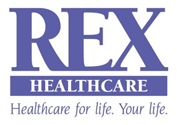 |
Rex Hospital Donates AEDs to Carter-Finley Stadium |
Dr. James. R. Jones, a retired NC State professor of animal science, knows as well as anyone the importance of having quick emergency healthcare at a sporting event.
Two years ago, Dr. Johnson was leaving the RBC Center, following an NC State men’s basketball victory over Georgia Tech, when he went into cardiac arrest and collapsed on the mezzanine level of the arena, just a few dozen steps away from the Rex Healthcare health room.
 He got immediate attention, both from a doctor sitting in Section 109 who administered CPR, and from the Rex Emergency Response Team stationed, which used a portable automatic external defibrillator (AED) to help restart Dr. Jones’ heart.
He got immediate attention, both from a doctor sitting in Section 109 who administered CPR, and from the Rex Emergency Response Team stationed, which used a portable automatic external defibrillator (AED) to help restart Dr. Jones’ heart.
“I was pretty lucky – my heart surgeon told me there were only two places that night that I could have survived that heart attack, in the RBC Center so close to a health room and in an emergency room,” said Dr. Jones, now 74 with a pretty clean bill of health.
So it was with a good bit of pride that Dr. Jones’ daughter, Jenny Johnson, a Rex Healthcare marketing and communications coordinator, was on hand Thursday for a brief presentation ceremony and demonstration as Rex Healthcare gave four AEDs to NC State University, to be permanently installed at Carter-Finley Stadium’s Vaughn Towers.
The four AEDs, critical life-saving equipment for patients who have gone into cardiac arrest, will be mounted on each of the four floors of Vaughn Towers. They will be used in addition to the five portable AEDs that are carried throughout the stadium and the parking lots on game day by Rex Healthcare ERT bike patrols.
NC State athletics director Lee Fowler and football coach Chuck Amato were on hand to accept the gift of the AEDs.
“When these (AEDs) first started to be used prominently a few years ago, we discussed whether or not we would be able to afford to install these permanently,” Fowler said. “For Rex Healthcare to step up and to donate these, we are very excited.
“We hope we never have to use them, but this is a good thing for Wolfpack fans and our ability to protect them while they are here for football games.”
History suggests that they will be used: over the last 10 years, Rex Healthcare has treated more than 6,000 patrons at various events at Carter-Finley Stadium, according to Mary Lou Bass, the manager of Rex’s Emergency Response Teams.
Not all of those, obviously, were in need of defibrillators. But in a stadium that is generally filled with fans of all ages, usually caught up in the excitement of college football, they are a necessary tool in providing emergency healthcare.
““We know AEDs increase survival rates,” Bass said. “Studies show that patients who go into cardiac arrest, if they get CPR or defibrillation within the first three minutes, they have a 74 percent chance of survival. If two more minutes pass, the survival rate decreases to 40 percent.”
For every minute that passes, survival rates decrease by 10 percent.
“We hope they are never needed, but we are glad that they are here,” Bass said.
Thanks to NCSU’s Tim Peeler for this capcom story & graphic.